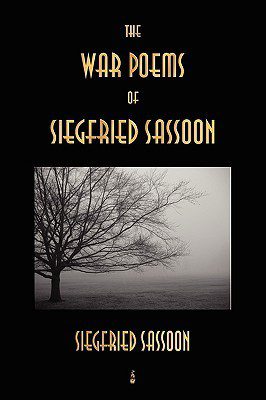Title: The War Poems of Siegfried Sassoon
Author: Siegfried Sassoon
First published January 1, 1919
92 pages, Paperback
ISBN: 9781603862844 (ISBN10: 1603862846)
Rating: 4.23
Overview
The War Poems of Siegfried Sassoon by Siegfried Sassoon is a poignant and unfiltered collection of sixty-four poems that encapsulate the true essence of war. From “The Troops” to “Everyone Sang,” Sassoon paints a vivid picture of the harsh realities of war, the sacrifices made by soldiers, and the emotional toll it takes on them.
The poems delve into the themes of heroism, sacrifice, loss, and survival, and offer a glimpse into the psyche of those who fought in the trenches. This unabridged edition is a must-read for anyone interested in the human experience of war and the power of poetry to convey it.
About the Author
Siegfried Loraine Sassoon was born into a family of bankers and had two brothers. His parents separated when he was young, and he didn’t have much contact with his father after that.
Sassoon presented his first book at the age of 11 to his mother. He spent his childhood hunting, playing cricket, reading, and writing, and was homeschooled until he was 14 due to his ill health.
He attended Clare College, Cambridge, but didn’t complete his degree. In 1911, Sassoon read a book called “The Intermediate Sex,” which was about homosexuality, and it was a revelation to him.
In 1913 he wrote a parody of a John Masefield poem, called “The Daffodil Murderer,” which was his only pre-war success. He enlisted in the Sussex Yeomanry on August 3, 1914, the day before Britain entered the war.
He later joined the Royal Welch Fusiliers as a second lieutenant. In November, Sassoon’s brother Hamo died at Gallipoli, and Sassoon was shipped to France with David Thomas.
He met Robert Graves there, and it was described in his diary as “a young poet in Third Battalion and very much disliked.” After a while, Sassoon abandoned his transport duties and went out on patrols whenever possible, desperate to kill as many Germans as he could. He earned the nickname “Mad Jack.” In 1917, while recovering from a wound, he decided to make a stand against the war.
The army sent him to Craiglockhart, an institution for soldiers driven mad by the war. He met and influenced Wilfred Owen there.
In 1918, he returned to active service briefly in Palestine and France, but he was wounded by friendly fire and ended the war convalescing. After the war, he got married and had a son named George.
He continued to write, but he is remembered as a war poet.
Editoral Review
The War Poems of Siegfried Sassoon by Siegfried Sassoon, first published on January 1, 1919, is a powerful collection of poems that captured the realities and horrors of World War I. Sassoon, a decorated British soldier and poet, provided a unique perspective on the war, drawing from his personal experiences as a front-line soldier.
The collection delivers an emotional and moving account of the trauma and devastation of war, which has made a significant impact on the war poetry genre. The War Poems of Siegfried Sassoon contains 64 poems that showcase Sassoons stunning poetic style and vivid imagery.
The poems are divided into three sections, offering different perspectives on the war experience. The first section focuses on the pre-war idyll, the second section showcases the horrors of war, while the third section looks at the aftermath of the war.
Sassoon uses his poetry to critique the war and to question the institutions and individuals that led to its occurrence. He speaks out against the senseless loss of life, the propaganda that fueled the war, and the political incompetence in the management of the war.
The War Poems of Siegfried Sassoon is a valuable historical and cultural document that provides insight into the psyche and experiences of soldiers during World War I. The work is a poignant reminder of the devastating human cost of war and its impact on individuals and society.
The poems are also an important literary work, showcasing Sassoon’s mastery of language and poetic form. Sassoon employs a number of literary techniques to convey the war experience, including wide-ranging use of imagery, symbolism, and metaphor.
His use of language is deliberately stripped-down, conveying the stark realities of the battlefield, while retaining a sense of emotion and humanity. The collection is both emotive and powerful, with each poem presenting a unique account of the war experience.
One of the strengths of the collection is the way Sassoon portrays the complexities and contradictions of war. He captures the heroism, camaraderie, and humanity of soldiers, while also depicting their struggles with mental illness, injury, and death.
Sassoons portrayal of the psychological toll of war is particularly powerful, offering a window into the effects of trauma in combat. However, the collection does have its limitations.
While relying on a common theme, some of the poems appear repetitive or disjointed, making it difficult to discern their specific meanings. Additionally, some of the language may be dated, making it challenging for contemporary readers to fully engage with the work.
Overall, the War Poems of Siegfried Sassoon is an outstanding collection of poems that offer a unique and poignant account of the human cost of war. Sassoons use of language and poetic form is masterful, while his portrayal of the psychological impact of war is both complex and compelling.
The collection resonates with both historical and literary significance and is an essential read for anyone interested in war poetry or the impact of war on individuals and society. The War Poems of Siegfried Sassoon is highly recommended to readers who enjoy poetry and history.
The book is an ideal read for those who want to reflect on the human cost of war and the impact of trauma on individuals. It is a sobering and emotive account that provides a timely reminder of the need to strive for peace and understanding in our world.
On a scale of 1 to 10, The War Poems of Siegfried Sassoon by Siegfried Sassoon deserves a solid 9 for its eloquent writing, powerful themes, and historical significance.



